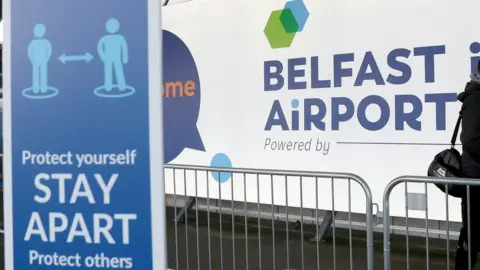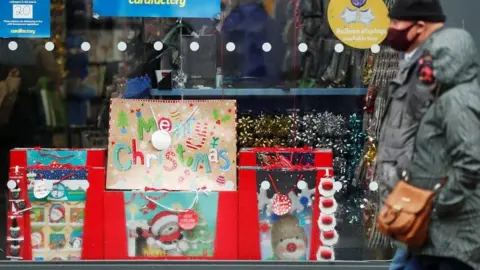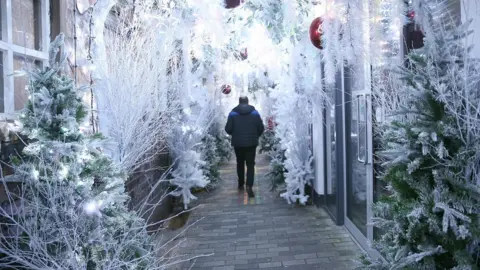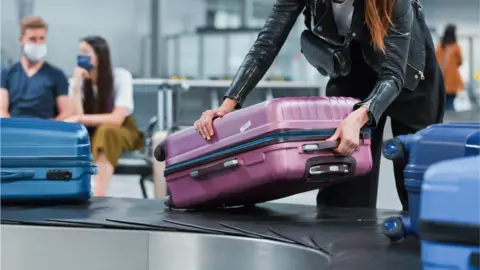Covid-19: NI Executive meeting over GB-NI travel ban
 Pacemaker
PacemakerA NI Executive meeting is under way to consider a paper on whether to impose a travel ban from GB.
Earlier, the deputy first minister said the executive must meet to agree a ban as "we are facing a grave situation".
The health minister took advice from the Attorney General and set out that in a paper to the executive.
It is understood Robin Swann has recommended issuing guidance advising against non-essential travel between NI and GB, and NI and the Irish Republic.
The minister has also advised that people arriving into Northern Ireland should self-isolate for 10 days.
It is understood Sinn Féin Finance Minister Conor Murphy has now written to Mr Swann expressing "dismay and astonishment" that he is not moving immediately to instigate a ban on travel between Northern Ireland and Great Britain.
He has called on Mr Swann to reconsider his approach.
Mr Swann's paper also makes the case for progressing work regarding any changes in the law needed to impose a ban - Mr Murphy has called on the minister to "move urgently" to complete this, in order to introduce a ban.
More than 40 countries, including the Republic of Ireland, have banned UK arrivals because of concerns about the spread of a new variant of coronavirus.
Earlier the first minister said it is "probable" the variant is already in NI.
Arlene Foster said four cases in NI were being tested to determine if they are the new highly infectious variant.
 Reuters
ReutersThe executive was already scheduled to meet on Tuesday morning to discuss the end of the EU exit transition period on 31 December.
On Sunday, the executive agreed so-called Christmas bubbles should be limited to one day.
The move followed action in England, Scotland and Wales on Saturday, cutting the previously agreed five days to just one..
Another seven coronavirus-related deaths were reported in Northern Ireland on Monday.
The Department of Health's death toll is 1,203. There were also a further 555 cases of Covid-19 diagnosed.
There are 446 people with Covid-19 in hospital. Thirty are in intensive care, with 24 on ventilators.
 PAcemaker
PAcemakerA new six-week lockdown for Northern Ireland comes into force at 00:01 GMT on 26 December.
Ministers met remotely on Sunday night to discuss the impact of the variant on Christmas rules.
The executive said there would be flexibility on which day between 23 and 27 December people come together, to accommodate those working on Christmas Day.
That meeting also discussed travel from Great Britain to Northern Ireland, but nothing was agreed.
Irish Minister for Transport Eamon Ryan said the ban on travel from Britain to the Republic of Ireland was initially for 48 hours, but added he did not want to give anyone "false hope that there is likely to be any major change".
No border controls would be set up on the Irish border, he added.
 Getty/izusek
Getty/izusekMr Ryan said his government would be making concerns about the lack of a GB-NI travel ban known, although it would be up to Stormont to decide what to do.
On Monday, the Irish government said there would be at least two consular flights departing on Tuesday evening to bring Irish residents home.
BBC News NI has asked if this would include people in Northern Ireland who have an Irish passport.
In a statement, the Irish Department of Foreign Affairs said "two specific and limited categories of people" were included.
These are international travellers to Ireland who are transiting through Great Britain and Irish people "currently on short trips to Great Britain" or who have travelled to Great Britain for "emergency medical treatment".
In the Republic of Ireland, there were 727 new cases reported on Monday.
The number of deaths linked to the virus is unchanged at 2,158.
'Downside consequences'
At Sunday's executive meeting, Sinn Féin had proposed prohibiting travel from Great Britain into Northern Ireland, and said this should be a priority.
The party wants the health minister to use powers from the 1967 Public Health Act to impose a ban on people entering from Great Britain.
But Mrs Foster said such a blanket ban was not a simple matter, would have "downside consequences" and that the executive would take legal advice from the attorney general on it.
She also said those living in the most infected areas are already prohibited from travelling, although she recognised some would try to "game" the regulations.
"There is a travel ban in place - it covers about 17m people in England, those people can't come to Northern Ireland," she told the BBC's Good Morning Ulster programme.
Mrs Foster said the new bubble rules would be placed in law, but added that she did not expect police to be "knocking on people's doors on Christmas Day or Boxing Day to check they are abiding by the law".
She said the four possible cases of the new variant under examination had "different sequencing" from other cases.
If you are reading this page on the BBC News app, you will need to visit the mobile version of the BBC website to submit your question on this topic.
On Sunday, four of the five main Stormont parties asked for an urgent executive meeting.
Sinn Féin, the SDLP and Alliance sent a joint letter to the first and deputy first ministers asking to meet.
In the letter, the parties said they must satisfy themselves that the Christmas restrictions and the six-week lockdown from 26 December were sufficiently robust to safeguard public health.
It is understood health minister and UUP member Robin Swann sent a separate letter with similar concerns.
